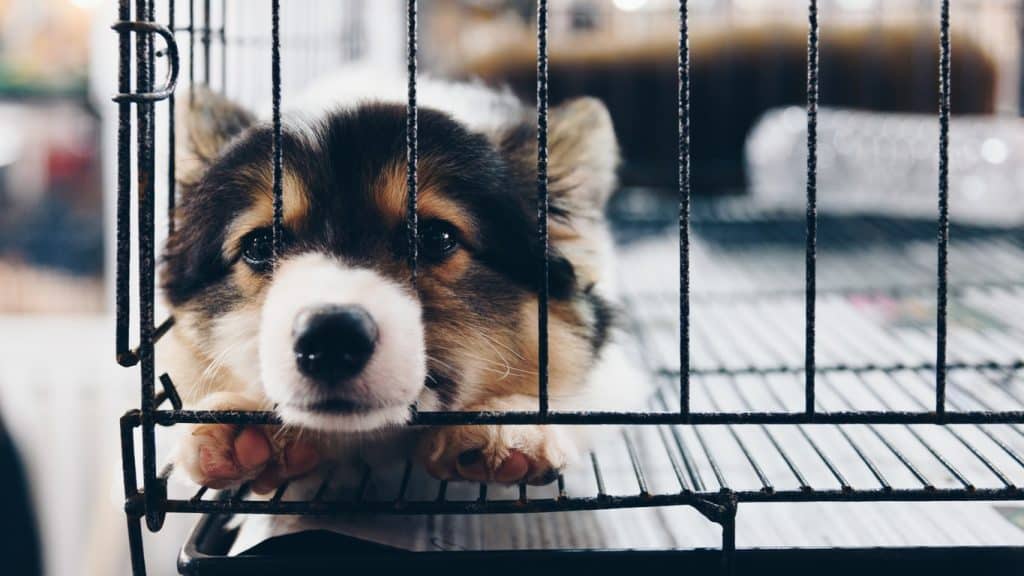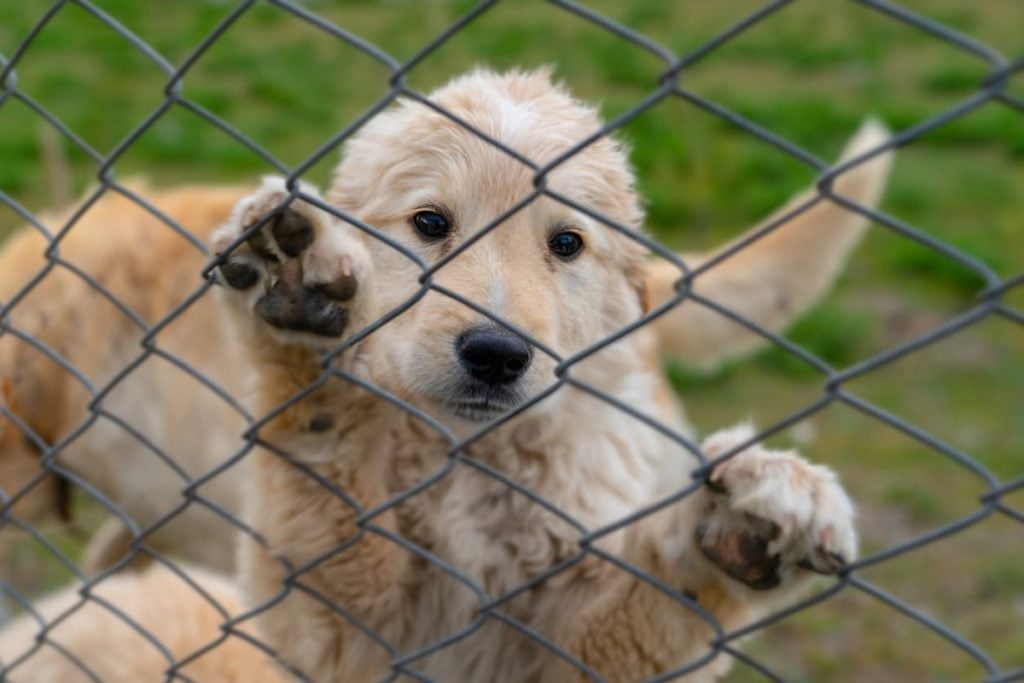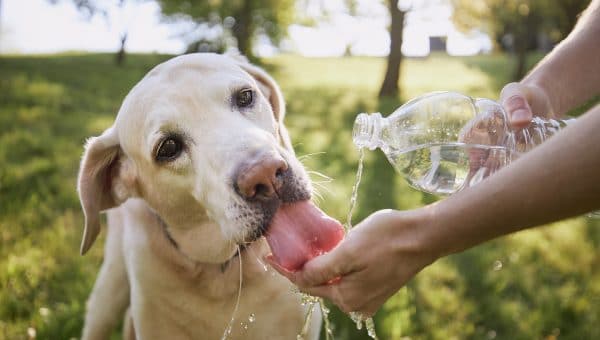- Not a substitute for professional veterinary help.
Adding a puppy to your family is a big decision. You have to ensure the time is right, prepare your home, get the whole family on board with caretaking and training, and find the perfect puppy!
Unfortunately, some places selling puppies are bad news for dogs and people, like puppy mills. Puppy mills are large-scale, commercial dog breeding facilities. They aim to make money by breeding and selling as many dogs as possible. Read on to learn all about puppy mills and how to spot them. At the end, we’ll give you tips on how to find a puppy from a safe, responsible source.
What is a Puppy Mill?
Dogs in puppy mills are kept in inhumane conditions, often caged for their entire lives, and bred repeatedly without regard for proper care or careful breeding. “Puppy mill” conditions can include:
- Small cages with wire floors that hurt dog paws and legs
- Cages stacked on top of one another without ample ventilation
- Poor sanitary practices leading to illness and parasites in puppies and dogs
- Forced breeding of female dogs with little time for recovery between litters
- Puppies separated from their mother at too young, which can impact their health and behavior for years
Unfortunately, puppy mills are not illegal in the U.S. In the 1960s, the Animal Welfare Act did establish minimum standards for commercially bred animals, requiring large-scale facilities to be licensed and inspected by the USDA. However, these outdated laws permit relatively poor conditions. Frustratingly, they only apply to operations that sell puppies to pet stores or online; they don’t regulate facilities that sell directly to consumers.
Why Are Puppy Mills Bad?
People often say, “I bought my puppy from a pet store, but she’s a wonderful pet.” While this may be true, unfortunately, the problem of puppy mills extends far beyond the individual dog.
Because of poor breeding and care conditions, puppy mill puppies will end up in pet stores and new homes with parasites, kennel cough, pneumonia, and other illnesses. Also, they may have behavioral problems, fear, and anxiety from being separated from their mothers and littermates too soon.
In addition to harming individual dogs, puppy mills injure the breeds they reproduce. Because puppy mills are focused on making money, they often breed dogs without regard for genetic quality. That makes puppies prone to congenital and hereditary conditions, like heart disease and respiratory disorders.
Lastly, puppy mills also take homes away from animals in shelters, rescue groups, and reputable breeders. Although an individual puppy mill puppy can grow into a happy, beloved family member, puppy mills harm many dogs. Puppy mills place profit over animal welfare.

iStock/PongMoji
How to Spot a Puppy Mill
You might not always realize the puppy you’re getting came from a puppy mill. Many online retailers and commercial pet stores that sell animals offer papers as “proof” of humane sourcing and can be very convincing. However, there’s no legal definition of “puppy mill” and no agency regulating the sale of puppies. So, even if a seller claims their puppies come from humane sources, they may come from puppy mills.
Here are some ways to identify a puppy mill in action.
Ask to visit their facility
Most reputable breeders will gladly show you where their litter is born and raised. Typically, this will be in their family home, where the puppies are socialized and well-cared for. Consider it a huge red flag if a seller refuses to show you their puppy’s living quarters. Moreover, if a seller wants to meet you in a park or parking lot, it’s usually because they don’t want you to see where the puppies live.
Along with requesting to visit their facility, ask if you can meet the puppy’s parents. It’s essential to see if they’re healthy and friendly and receive proper veterinary care. If the “breeder” declines, take it as a sign they’re operating a mill.
You may also want to ask:
- How old is the mother? She should be at least two years old. Puppy mills will breed dogs as soon as they’re physically able to do so.
- How many litters has she had? Female dogs should only have three to four litters in their lifetime. Puppy mills force females to produce litter after litter without adequate recovery time.
- Have the parents been tested for inherited conditions? This is standard care for responsible breeders. A good breeder will be transparent with test results.
Ask what puppies they have available
If you’ve spent any amount of time chatting with a good breeder, you’ll discover two things:
- They’re incredibly passionate about the breed they’re working with
- They’re dedicated to bettering the breed
As such, most reputable breeders will stick to focusing on just one breed—two, at most. Puppy mills, on the other hand, will pump out as many breeds as possible to turn a profit. If a seller offers multiple breeds, you’re likely looking at a puppy mill.
Additional questions to ask include:
- What health issues do they see most commonly? Reputable breeders will be forthcoming with health issues or concerns. Unlike puppy mills, they can provide paperwork on vaccinations and veterinary visits.
- Do they breed designer breeds? It’s a big red flag if a seller has many different types of purebred dogs or “designer” hybrid breeds.
- How many litters do they have at a time? Ethical breeders will only have one litter at a time, so you’ll usually be waitlisted for a puppy. Year-round availability points to a puppy mill.
Look for signs in their advertisement
If you’ve found your dream puppy through the Internet or a classified ad, here are some things to watch for:
- The puppy is priced very low: To grab the attention of prospective buyers, puppy mills will often slash prices. Generally, good breeders don’t offer sales or discounts because there is always demand for their puppies.
- They’re sold online: Most reputable breeders don’t need to advertise online. It could be a puppy mill if you’ve found an ad on Craiglist, eBay, or an online forum. Similarly, if you’ve landed on an online store that lets you browse and add puppies to your cart with a click, you can bet it’s a puppy mill.
- The buying process is rushed: It’s also very telling if a “breeder” is trying to make a quick sale. Good breeders care about their dogs and are more interested in finding a good match than making a profit. This means you can expect a lot of questions about your family and lifestyle. So, if you can click and pay for a puppy without screening, it’s probably a puppy mill.
Other signs of a puppy mill
Here are some final clues you could be dealing with a puppy mill.
- The puppy comes from a pet store: Sadly, most puppies in pet stores come from puppy mills.
- Seller wants to ship puppy: If a seller/breeder is located in another state and will send a puppy without an in-person meeting first, it could be a puppy mill.
- Seller doesn’t provide a contract: All ethical breeders will have a contract to protect their puppies. Usually, this will include a spay/neuter agreement and return-to-breeder clause should you become unable to care for the dog.
- Puppy brokers are involved: These middlemen make money by sourcing and transporting dogs from puppy mills to pet stores. Working under the guise of “puppy finders,” they may also sell the puppies themselves through dressed-up online stores.
- There’s zero follow-up: Many reputable breeders will stay in contact to see how their dogs are doing. Puppy mills want to move puppies through quickly with no additional check-ins.

iStock/Thankful Photography
How To Be Sure You Are Working with a Reputable Breeder
Contact reputable breeders and breed-specific rescue groups if you’re looking for a purebred puppy. The best way to find a reputable dog breeder is to get a referral from friends, your veterinarian, or an official breed club in your area. The AKC website offers a guide and directory to find a responsible breeder.
Responsible breeders provide a healthy, loving environment for their dogs. They seek the same in a new family for their puppies. Responsible dog breeders will:
- Introduce you to the puppy’s parents and show you where they live
- Explain the puppy’s vaccine and medical history and give you a vet’s contact info
- Not have puppies available year-round; may keep a waiting list of interested families
- Answer any questions you may have about the puppy’s background and care, as well as their breeding practices
- Ask about you: your family’s lifestyle, why you want this kind of puppy, how you will care for and train it, etc
- Avoid pressure sales tactics. Ethical dog breeders and rescue groups are not in it to make money. Instead, they believe in maintaining and furthering the breed and finding a good fit for every dog
If you want a puppy but don’t care what breed it is, your local animal shelter or rescue group is a great resource!
How to Tell if Your Dog May Be a Puppy Mill Dog
Not only do puppy mill dogs suffer inhumane conditions, but they can also develop physical and behavioral issues that are problematic for the pet and you.
A poor diet and inadequate grooming and veterinary care mean their health is often compromised. These dogs may experience dental disease, parasites, respiratory problems, and urinary infections. There’s also a risk of inherited genetic disorders, like epilepsy or kidney disease.
In addition, puppy mill dogs are socially deprived, which can manifest as anxiety or fear. They may be overly shy, aggressive, or afraid of new things. If you suspect your dog came from a puppy mill, remember they’ll need extra patience and care. These dogs can still lead happy, full lives. To give them the best chance of adjusting, ensure they receive proper preventative care and consider enrolling them in puppy training classes.
The Takeaway About Puppy Mills
It’s hard to resist an adorable puppy. But before you take a puppy home from an online ad or pet store, consider the source.
There are also ways you can help make puppy mills a thing of the past. If you encounter a puppy mill with evidence of cruelty or neglect, you can report it to your local animal control agency or police. Additionally, you can file a report with the Humane Society of the United States by calling 1-877-MILL-TIP.





